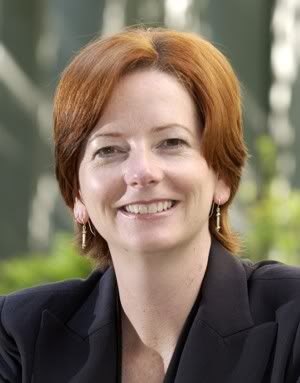Welsh-born lawyer Julia Gillard became Australia's first woman prime minister Thursday after the once hugely popular Kevin Rudd fell to a party coup less than three years after taking office.

"I asked my colleagues to make a leadership change because I believe that a good government was losing its way... and at risk at the next election," Gillard said. "I was not going to sit idly by."
Gillard, 48, pledged to seek a popular mandate within months, and set about reversing the issues that sank Rudd by pursuing a dropped carbon trading scheme and urging mining chiefs to cancel a TV campaign against a planned new tax. The plea drew immediate dividends as BHP Billiton, the world's biggest mining company, cancelled its TV ads as a "sign of good faith".
But analysts raised questions over the manner of her ascension, which came through shady backroom deals hatched by political power-brokers and ended in a hasty dismissal for Rudd, elected by a landslide in 2007.
Rumblings of a leadership change surfaced only late on Wednesday, when Rudd emerged from talks with Gillard to announce the surprise parliamentary party vote on Thursday morning.
Analysts were stunned at the fall from grace of Rudd, who plummeted from record support levels to become the first Australian prime minister deposed in office since Labor's Paul Keating unseated Bob Hawke in 1991.
Rudd was not "assassinated" over any great policy question. Unlike the Liberal Party’s decision to tear down Malcolm Turnbull over an emissions trading scheme and replace him with Tony Abbott, there was no big policy struggle between Rudd and his deputy. Gillard was a party to every major decision of the Rudd government.
According to some of her key supporters, the deciding factor was the front-page report in The Sydney Morning Herald that day that revealed Rudd’s chief of staff had been quietly testing support for Rudd within the party. Which implied that although Gillard had been steadfastly loyal, Rudd did not trust her public assurances. That breach of good faith fired the spark of anger to move Gillard to challenge her leader.
In 2006 she joined with Kevin Rudd to wrest the leadership of the party from Kim Beazley. The "marriage of convenience", as it was dubbed at the time, delivered the Labour Party a win at the 2007 election, ending 11 years of Liberal rule. The victory also handed Ms Gillard the deputy prime ministership, a role which she excelled in. As Mr Rudd's fortunes waned, Ms Gillard continued to perform, winning a fight with the teachers' union and securing fans from all corners of politics. Soon the leadership questions began.
In May, Peter Beattie, the former Queensland premier, said that Ms Gillard would make a "brilliant" prime minister. Mr Rudd was unfazed, saying that his deputy would make a fantastic prime minister "one day". That day has arrived faster than he could have imagined. She has named Nye Bevan, the former Welsh Labour leader, as one of her political heroes.
The rapid developments even stunned Gillard's family, which emigrated from Wales in 1966. "I knew that she would be a performer as a participant in the arena,
and that she would be formidable and that she would certainly rise,"
father John Gillard said. "But I never thought she would rise to the position of prime minister. But there we are, that's what happened."
As well as being the first female prime minister, she is also Australia's first non-married leader. Ms Gillard is in a long-term relationship with Tim Mathieson.






No comments:
Post a Comment